Looking across this sea of anxious faces, it’s easy to forget this is a holiday. Knotted brows frame weary eyes in a crowd as deep as a football field, all of them waiting to catch a train out of Beijing. The mass exodus from China's cities is the roaring crescendo leading up to Chinese New Year, or Spring Festival as it’s known in the country. On paper the holiday can be equated to Thanksgiving, Christmas and New Year's rolled into one, but on the ground the holiday unfolds on an entirely different scale.
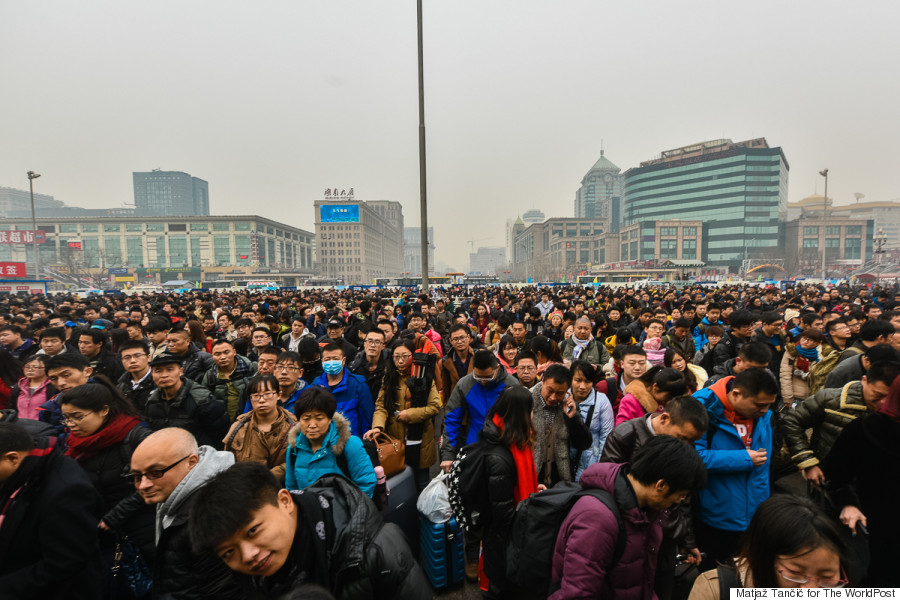 A crowd lines up outside Beijing Railway Station on Sunday. Spring Festival is a crater in the middle of China’s calendar, a multi-week event when factories, schools and offices are shut down, and the country’s 30-year urbanization drive is jolted into reverse. Tradition dictates that all Chinese return to their hometowns during Spring Festival, spurring the largest human migration on Earth. Chinese New Year is the chance for migrant workers who have been grinding out 60-hour weeks in the city to show off their earnings at home, and for grandparents still tilling the soil to size up their collegiate grandchildren. On Monday alone, two days before New Year's Eve, China saw roughly 80 million departures by train, bus, boat and plane. That’s equivalent to every single resident of California, New York and Florida skipping town on the same day. Slow train to Xinjiang
A crowd lines up outside Beijing Railway Station on Sunday. Spring Festival is a crater in the middle of China’s calendar, a multi-week event when factories, schools and offices are shut down, and the country’s 30-year urbanization drive is jolted into reverse. Tradition dictates that all Chinese return to their hometowns during Spring Festival, spurring the largest human migration on Earth. Chinese New Year is the chance for migrant workers who have been grinding out 60-hour weeks in the city to show off their earnings at home, and for grandparents still tilling the soil to size up their collegiate grandchildren. On Monday alone, two days before New Year's Eve, China saw roughly 80 million departures by train, bus, boat and plane. That’s equivalent to every single resident of California, New York and Florida skipping town on the same day. Slow train to Xinjiang
For this crowd pressing up against Beijing’s ticket windows, those numbers are just an abstraction of the very real crush of humanity they will soon be inhabiting. Trains are swamped, with the unfortunate holders of standing-room-only tickets setting up shop in the aisles, stairwells and sinks.
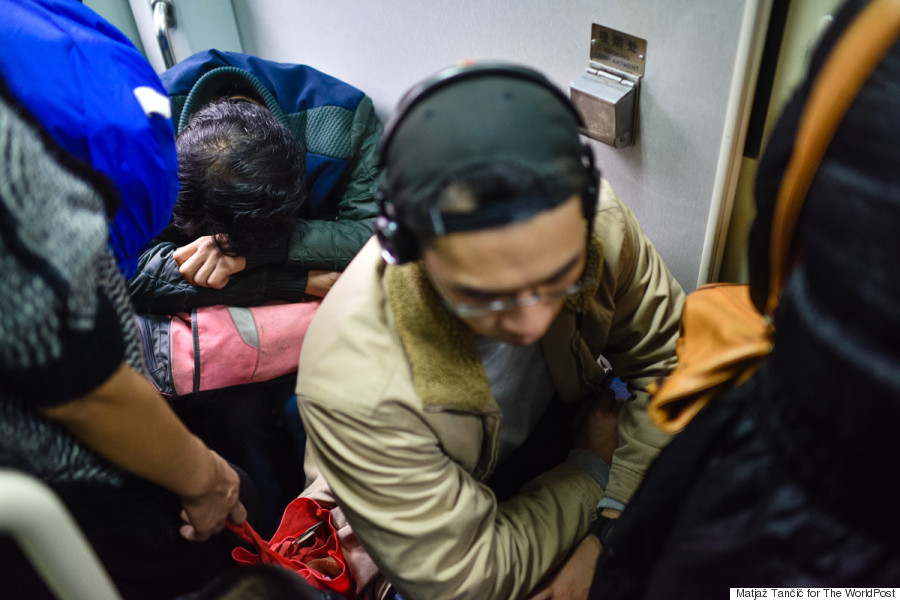 Passengers with standing-room-only tickets bring their own buckets and stools, but often end up sleeping in sinks or stairwells.
Passengers with standing-room-only tickets bring their own buckets and stools, but often end up sleeping in sinks or stairwells.
Seating stakes are highest on long-haul routes, and the T177 is about as long as they come. This hulking vehicle will take 39 hours and 25 minutes to traverse the 1,998 miles from Beijing to Urumqi in northwest Xinjiang Province. Xinjiang is home to the bulk of China’s Uyghur population, a Turkic and central Asian ethnic group that practices Islam and maintains a culture and language indecipherable to members of China’s dominant Han ethnic group. Tensions between Uyghurs and Han have boiled over in recent years, with deadly riots and terrorist attacks sparking state-mandated bans on Islamic hijabs and long beards. Chinese police say that foreign-trained jihadist cells operate throughout the province, while Uyghur activists decry what they call discriminatory treatment on jobs and religion. Passengers on the train T177 hail from Han, Uyghur, Kazakh and Mongol ethnic groups, but during boarding they all share a common goal: locking down a (relatively) comfortable surface for the ride ahead. Chinese train cars have a clear hierarchy of accommodations, with the “hard seat” compartment at the bottom of the totem poll. Those sitting in the stiff seats share their floor, bathroom and luggage space with the standing passengers, making for compulsory coziness. Hard seat compartments present a cross-section of middle-class Chinese society. Here in carriage 17, migrant workers rub shoulders with bubbly university students eager to show off their big-city styles to high school classmates. Policemen, noodle chefs and white collar workers face each other across cramped booths, and the combination of card games, grain alcohol and forced cohabitation nudges most people into conversation.
 Cigarettes and Instant Noodles “Is it easy to find work in Urumqi?” asks 42-year-old Liu Changbao, looking up from a sturdy squat in the linkage car. Beside his feet lies all the luggage he’s bringing for the train ride and the year of manual labor ahead of him: a plastic bag holding two cups of instant noodles and a pack of cigarettes. Liu is unusual in that this train is taking him away from home rather than back there. He says he doesn’t care about the Spring Festival family gathering –- a sacrilegious sentiment in China’s Confucian culture -– and that he’s trying to get a jump on the job rush that kicks into gear after the holiday. Liu has worked as a farmer, welder and driver across China, and he picked Urumqi after seeing a television segment about Xinjiang. After the 39-hour ride, Liu plans to find a flophouse near the station and immediately commence his job hunt. He doesn’t know how to use a computer or a cellphone, but remains confident that once he hits the streets he’ll be back at work in a matter or days. For now his main concerns are whether it’s cold in Xinjiang and whether locals will speak Mandarin.
Cigarettes and Instant Noodles “Is it easy to find work in Urumqi?” asks 42-year-old Liu Changbao, looking up from a sturdy squat in the linkage car. Beside his feet lies all the luggage he’s bringing for the train ride and the year of manual labor ahead of him: a plastic bag holding two cups of instant noodles and a pack of cigarettes. Liu is unusual in that this train is taking him away from home rather than back there. He says he doesn’t care about the Spring Festival family gathering –- a sacrilegious sentiment in China’s Confucian culture -– and that he’s trying to get a jump on the job rush that kicks into gear after the holiday. Liu has worked as a farmer, welder and driver across China, and he picked Urumqi after seeing a television segment about Xinjiang. After the 39-hour ride, Liu plans to find a flophouse near the station and immediately commence his job hunt. He doesn’t know how to use a computer or a cellphone, but remains confident that once he hits the streets he’ll be back at work in a matter or days. For now his main concerns are whether it’s cold in Xinjiang and whether locals will speak Mandarin.
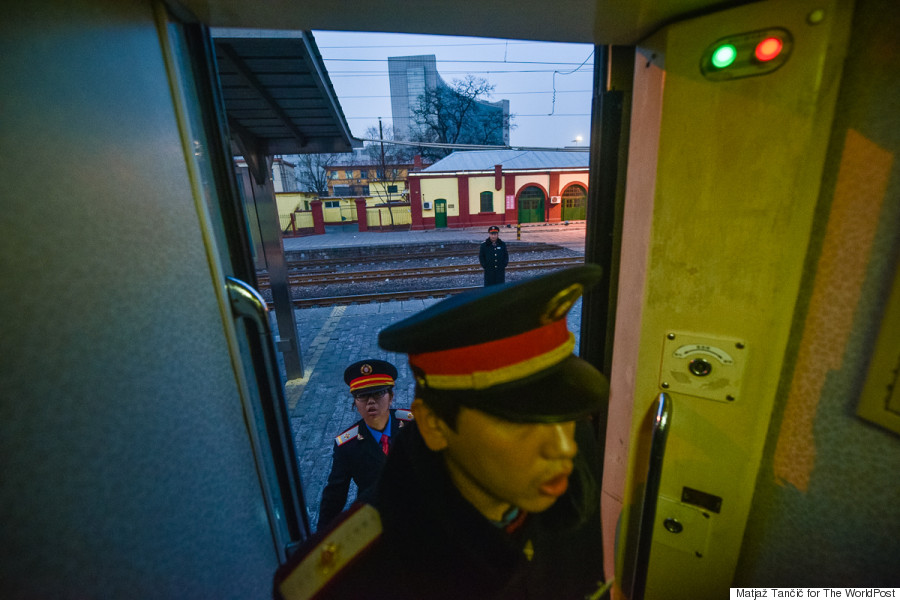
“We welcome you to Urumqi”
Back in carriage 17, a young train attendant named Zulpikhar is checking tickets against IDs. He makes small talk while squeezing past people huddled in the aisles, commenting on the passengers’ hometowns.
“It says here you’re a journalist,” Zulpikhar says while scanning a visa. “We welcome you to come to Urumqi. I’m a Uyghur.”
He holds the glance for a moment and flashes a smile before winding his way down the crowded car. Once Zulpikhar is out of earshot Wang Xin, a 32-year-old dentist standing over my seat, leans in with a worried look on his face.
“You’re not afraid of going to Urumqi?” he asks.
The city has seen knife and bomb attacks on local Han, and that has scared many Chinese tourists away from the province’s gorgeous landscapes.
“If you stay in the city it should be OK, but don’t go out to the villages on the outskirts,” Wang continues. “The Kazakhs are alright, but the Uyghurs … it’s hard to say.”
Wang’s unease is partially rooted in fear of Uyghurs’ foreign customs and religion, but he echoes a common Han refrain about the superiority of his culture’s business acumen.
“When Han businessmen arrive [Uyghurs] just can’t compete,” Wang claims, “so they turn to violence.”
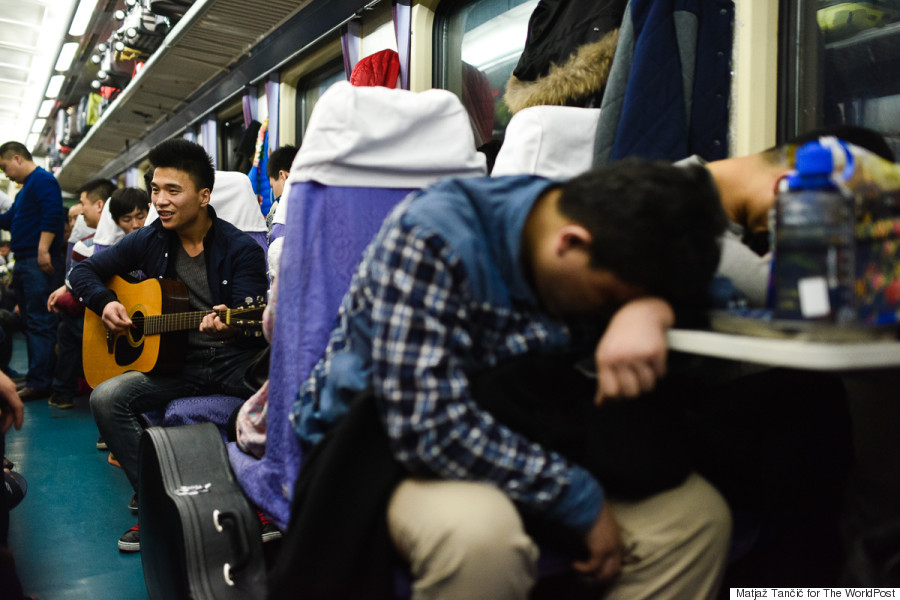 Li Xin dropped out of middle school and has been playing music on the road since he was 17.
Li Xin dropped out of middle school and has been playing music on the road since he was 17.
Duets
As the sun tucks itself in behind rolling hills, Li Xin unpacks his acoustic guitar. The initial rounds of small talk have died down, and 26-year-old Li feels out the mood as he picks a few gentle chords. His first Chinese love ballad receives approving applause from the carriage, and he transitions into a smokey-voiced tribute to his adopted home of Beijing. Li grew up on a grape farm outside of Urumqi, and he dropped out of middle school to apprentice as a welder. At age 17 he joined a traveling song-and-dance troupe that tricked him out of a year's worth of wages. After singing folk ballads on the streets of Urumqi for a couple years, he headed to Beijing and found good work performing at a local bar. After a couple of songs, Zulpikhar steps in and asks to borrow the guitar and a seat, quickly launching into flamenco-infused Uyghur folk songs. Syncopated rhythms and pleading vocals fill the carriage, captivating the surrounding booths and drawing shouts of encouragement. After a couple songs and a crooning duet with Li Xin, Zulpikhar makes his way back down the aisle, blushing at the compliments as he heads to his booth.
Half an hour later, Zulpikhar’s manager marches him back into the car, this time with her video camera in tow. When she hits record, Zulpikhar introduces himself, offers to play his culture’s traditional music for weary travelers, and launches into a reprise of his earlier performance. While Zulpikhar plays a song called “White Rabbit,” a middle-aged Uyghur woman is summoned from an adjoining car to perform a traditional dance to the music. The orchestrated curtain call makes for a well-documented display of ethnic unity and social harmony, slogans the Chinese government has plastered throughout Urumqi and backed up with heavily armed military police on street corners. After the performance, passengers return to their phones, blasting out the videos they just took across Chinese social media. Minutes later Zulpikhar walks back down the aisle, this time with a large black bag in hand. “Trash, trash, anybody have trash?”
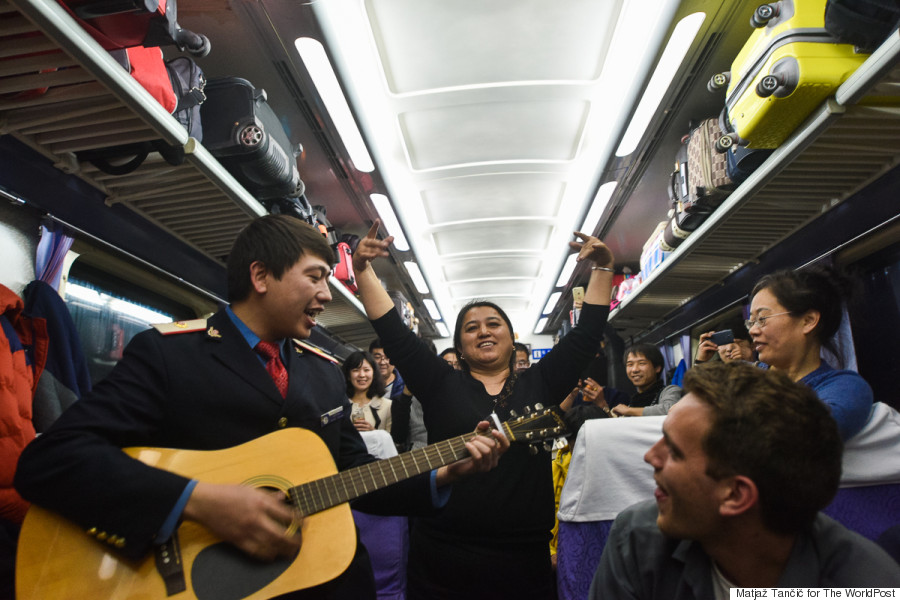 Zulpikhar entertaining carriage 17. Pompeii on a Train Once the card games, drinking games and cell phone games have shut down for the evening, the people of carriage 17 shift and wriggle uncomfortably toward sleep.
Zulpikhar entertaining carriage 17. Pompeii on a Train Once the card games, drinking games and cell phone games have shut down for the evening, the people of carriage 17 shift and wriggle uncomfortably toward sleep.
Even in the dead of night, fluorescent lights in the hard seat compartment never shut off. It’s a policy with a purpose -- total darkness in a packed car would be an invitation to mayhem -- but the unceasing illumination presents passengers waking at 4 a.m. with a Pompeii-esque tableau: hundreds of men, women and children slumped unconscious across the booths, sinks and stairwells. At 5:30 a.m. one chipper passenger signals the start of the day by blasting local music out of a tinny radio. For most of the day ahead, the carriage exists in the throes of a collective hangover, never fully awake and nowhere close to comfortable.
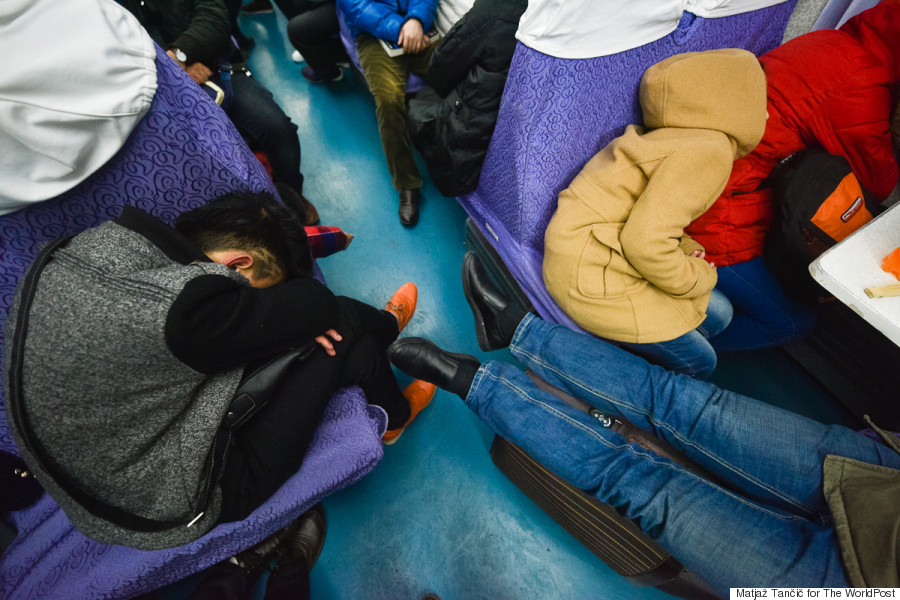 Consolation comes in the form of a steady thinning out of the train. The western half of China’s landmass is home to just one-twentieth of the Chinese population, and by the time train T177 has entered the deserts of Ningxia province, empty seats begin to open up. In the dining car, young couples snap selfies and tease each other as they prepare to meet the parents. Bringing a partner home during Spring Festival can be a nerve-wracking experience, with parental judgment often coming swift and harsh. But for now the train is spacious and the scenery is gorgeous. T177’s entrance to Gansu Province is marked by the appearance of camels set against snow-capped mountains. Welcome to Urumqi
Consolation comes in the form of a steady thinning out of the train. The western half of China’s landmass is home to just one-twentieth of the Chinese population, and by the time train T177 has entered the deserts of Ningxia province, empty seats begin to open up. In the dining car, young couples snap selfies and tease each other as they prepare to meet the parents. Bringing a partner home during Spring Festival can be a nerve-wracking experience, with parental judgment often coming swift and harsh. But for now the train is spacious and the scenery is gorgeous. T177’s entrance to Gansu Province is marked by the appearance of camels set against snow-capped mountains. Welcome to Urumqi
The final 16 hours of the train ride practically fly by. At each stop in the Gansu corridor passengers step out to breathe the crisp mountain air they’ve sorely missed in Beijing. As night falls for the second time, carriage 17 breaks into several games of the “Struggle the Landlord,” the official card game of long-distance train rides. 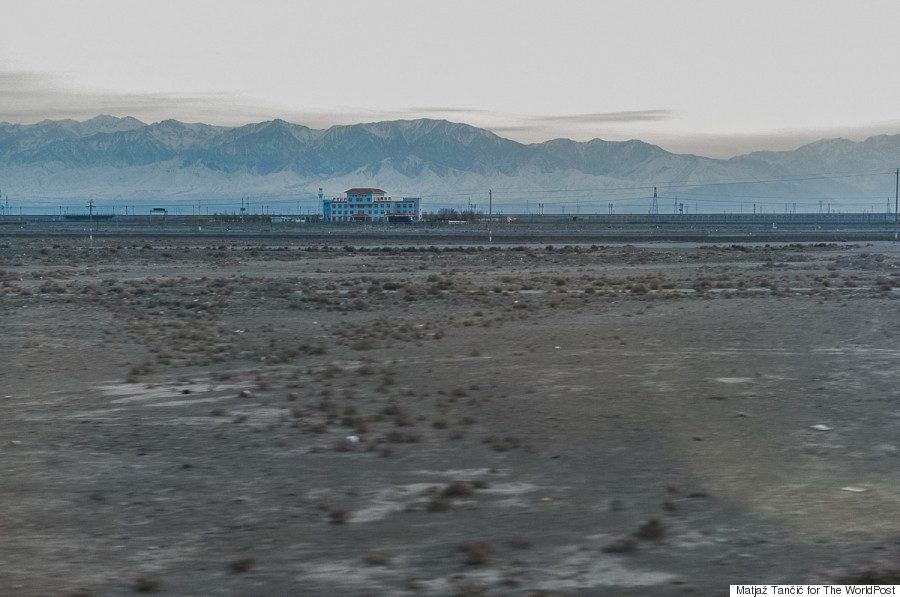
T177 crosses into Xinjiang Province around midnight, but it’s another six and a half hours to the provincial capital of Urumqi. For Zhao Xiaohui, an economics master's student in Beijing, Urumqi isn’t even the final destination -- he’s got another 12-hour train ride to the village where his parents grow peppers, wheat and the occasional batch of watermelons. He’ll stay there for seven days before making another 50-hour hard-seat journey back to Beijing. But is it worth it? “It’s all right,” Zhao shrugs. “When I was an undergrad I would ride this same train but I wouldn’t even have a seat. I’d just lie on the ground at night.” The sky is a deep purple as T177 pulls into Urumqi station at 6:40 a.m. It’s been 39 hours since these passengers left Beijing Railway Station, and in another 41 hours they’ll ring in the year of the sheep. They grab the bundles, buckets and suitcases stocked for celebration and set off into the Urumqi dawn.
This was produced by The WorldPost, which is published by the Berggruen Institute.
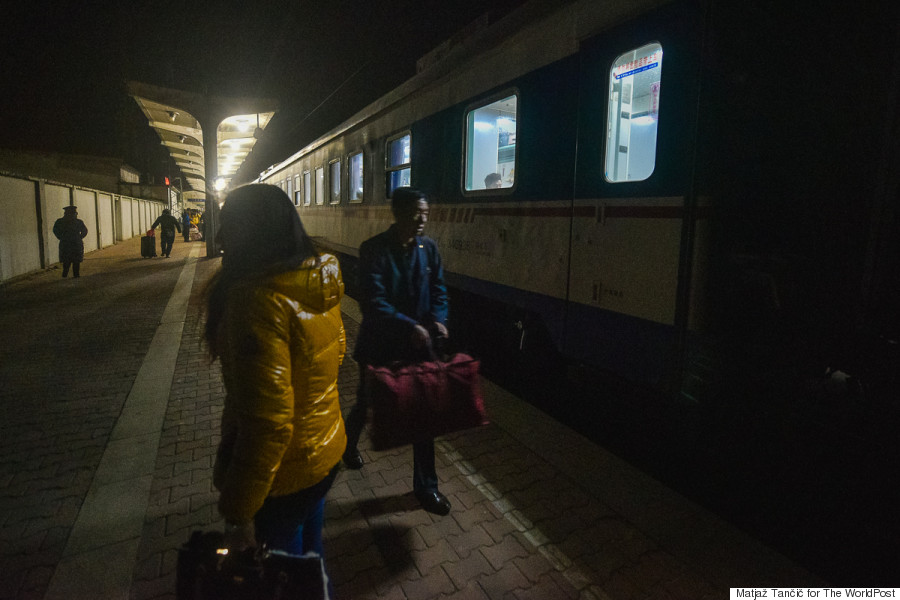 All photos by Matjaž Tančič.
All photos by Matjaž Tančič.
